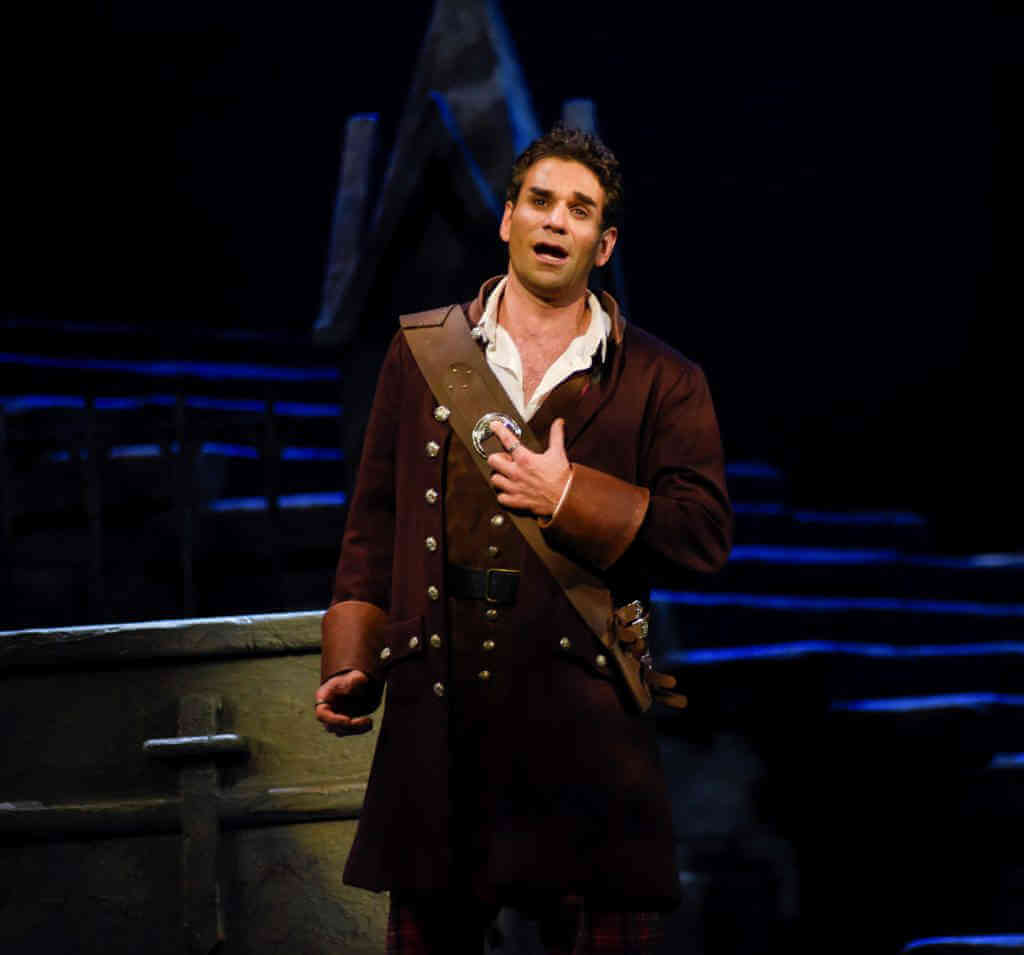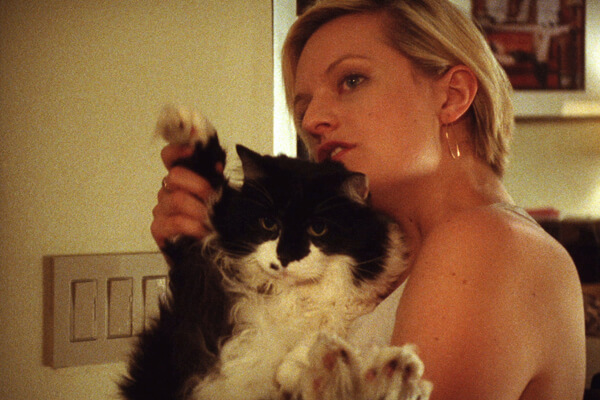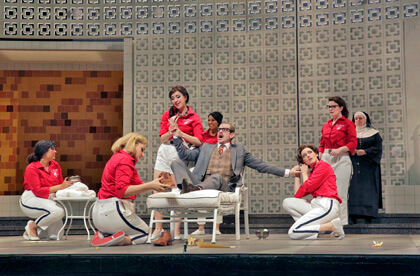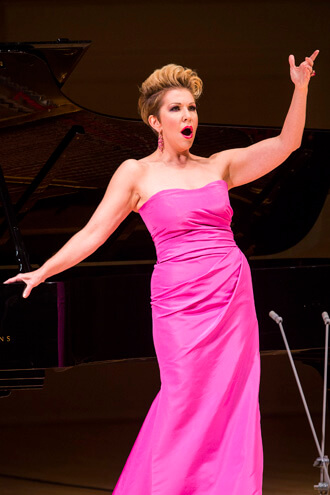Montreal offers a lot of classical music — as well as diversity, much of historical and architectural interest, fine restaurants, and a designated Gay Village not far via Metro or even by foot from the venues where the two operas I saw were performed. (Like many such ‘hoods, it’s said to be less gay than back in the day.)
“Lucia di Lammermoor” (November 9), from Opéra de Montréal, filled the vast, modern Salle Wilfrid-Pelletier, named for a longtime Met conductor married in turn to fine second-tier divas Queena Mario and Rose Bampton. As Lucia, Kathleen Kim took over rehearsals on a week’s notice from the vocally more opulent but usually dramatically static Albina Shagimuratova. The company was lucky to get Kim, a diminutive, vulnerable stage figure with some interpretive guts and notably good staccati. Her voice lacks much weight below and high E flats were not on this occasion stellar, but she more than earned her check.
The production’s raison d’etre and highest achievement was the very first Edgardo of locally bred and trained tenor star Frédéric Antoun. A very credible Romantic hero, Antoun sang extremely well in good style, balancing Gallic float with Latin ping in his phrasing. He offered — in key! — one of the best final scenes since Alfredo Kraus’ long tenure in the great role, this despite being ludicrously upstaged by five (!!!) ghosts, an ill-advised hallmark “innovation” (as if!) of Michael Cavanagh’s otherwise clunkily old fashioned staging in the late Robert O’Hearn’s “Victor Book of the Opera”-worthy sets.
Cavanagh and routine conductor Fabrizio Ventura — who allowed far too many 1970s-style held final high notes — also cut the dramatically crucial Wolf’s Crag Tower scene, something one doesn’t expect at an international house. This gave Gregory Dahl’s seasoned, professional Enrico not much to do. Oleg Tsibulko’s solidly unremarkable Raimondo got his scene with Lucia. Rising tenor Mario Bahg sounded wonderful in Arturo’s brief but exposed duties, and Florence Bourg contributed a sonorous Alisa, unfazed by high Bs.
The next day brought — Antoun’s work aside — a far more interesting occasion in Opera McGill’s “Clemenza di Tito.” Michael Hidetoshi Mori’s fluid, intelligent production ingeniously blended modern choral dress with Ginette Grenier’s compelling period robes; using much more of the recitative (farmed out by Mozart to an assistant), Mori and the impressive conductor Stephen Hargreaves made this sometimes static opera compelling and exciting to a diverse public.
All the students cast showed accomplishment. Maddie Studt’s Sesto proved outstandingly credible visually, vocally and technically. The Vitellia, Avery Lafrentz, had a comic blast and showed a mettlesome, wide-ranging voice that should settle in. Olivier Gagnon was vivid and agile if not always dulcet in Tito’s tricky music; in a sudden misstep, Hargreaves rushed him through the crucial finale. Elisabeth Boudreault furnished an appealing Servilia ready for professional stages. Any music-minded visitor to Montreal should check out McGill’s calendar.
At November 14’s Boston Symphony concert, later repeated in New York, Austrian soprano Genia Kuehmeier, long away for North America, confirmed her high vocal quality in Mahler’s Fourth and honorably followed the composer’s prescribed dynamics. Andris Nelsons didn’t channel much interpretive specificity with his technically top-notch players’ work. The concert’s takeaway was the truly sensational playing of Leif Ove Andsnes in Grieg’s flashy, derivative Piano Concerto.
The next night Carnegie hosted the Chicago Symphony under Riccardo Muti in a program focused on Rome. Bizet’s youthful “Roma”, despite some initially intriguing channeling of brass chords reminiscent of “Tannhaeuser,” proved an exercise in spurious orchestral color; to my surprise the string section seemed under-rehearsed, which they were assuredly not in the final work, Respighi’s facile showpiece “The Pines of Rome.” In between came the real deal: Berlioz’s cantata “La mort de Cléopâtre,” a practice run for his later heroine Didon in “Les troyens.” Muti gets Berlioz and shook the heavens, as did Joyce DiDonato in a terrifically impressive demonstration of meaningful French declamation, stage savvy, and the vocal chops (up to ringing high B flats) to evoke the Egyptian ruler’s pride, regret, and desperate resolve. The crowd veritably shouted its approval; high time for her Didon to occupy a local throne!
Unlike New York, our nation’s capital still has a flourishing concert organization, Washington Concert Opera. November 24’s “Hamlet” offered the kind of wow-I’m-glad-to-be-present experience that one associates with great evenings when the much-missed Opera Orchestra of New York presented such nonpareil stars as Mariella Devia, Gabriela Benacková, and Renato Bruson. Ambroise Thomas’ score — here shorn of the ballet — may not be adequate to Shakespeare’s play (what could be?) but can boast several very fine scenes. Antony Walker let us hear the usually suppressed original final scene, with a (somewhat) happy ending in which Hamlet, Gertrude, Polonius, and Laertes all survive.
Jacques Imbrailo, best known for Billy Budd and Pelleas, proved very impressive as a Byronic, style-imbued Prince of Denmark, bringing an emo Ralph Fiennes vibe to his dramatic performance and using layered dynamics to fill out the portions — like the much-derided drinking song, actually clever in context — somewhat heavily scored for his sonorous lyric baritone. Lisette Oropesa also achieved a musical and theatrical triumph as Ophelia, finding the part’s hurt and pathos as well as the terrific staccati and chromatic scales; she has become an excellent interpreter of French opera.
The others, while satisfying, needed some further Gallic stylistic coaching. Eve Gigliotti brought a wide-ranging, dramatically implicated sound to Gertrude, a fine part, and Jonas Hacker dispatched Laertes’ limited but not easy music with flair. If his Claudius sounded rather weathered, Tom Fox has kept his range and his stage artistry.
Walker had assembled several other imposing low-voiced singers in Matthew Scollin (Horatio/ First Gravedigger), Brian Kontes (Ghost, channeling “Semiramide”), and Timothy Bruno (Polonius). Walker’s forces, while not perfect throughout, played with intent. It was an exciting evening.
David Shengold (shengold@yahoo.com) writes about opera for many venues.




































